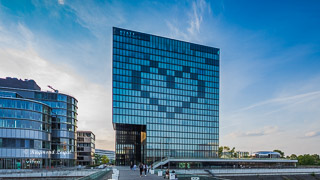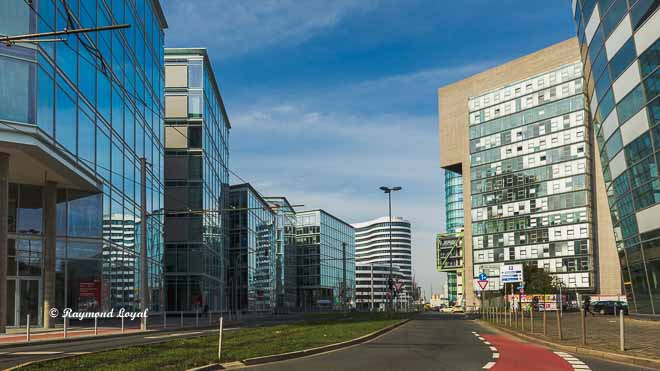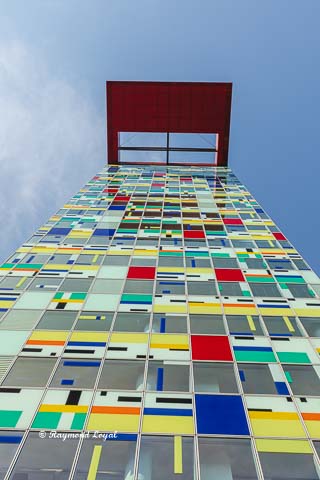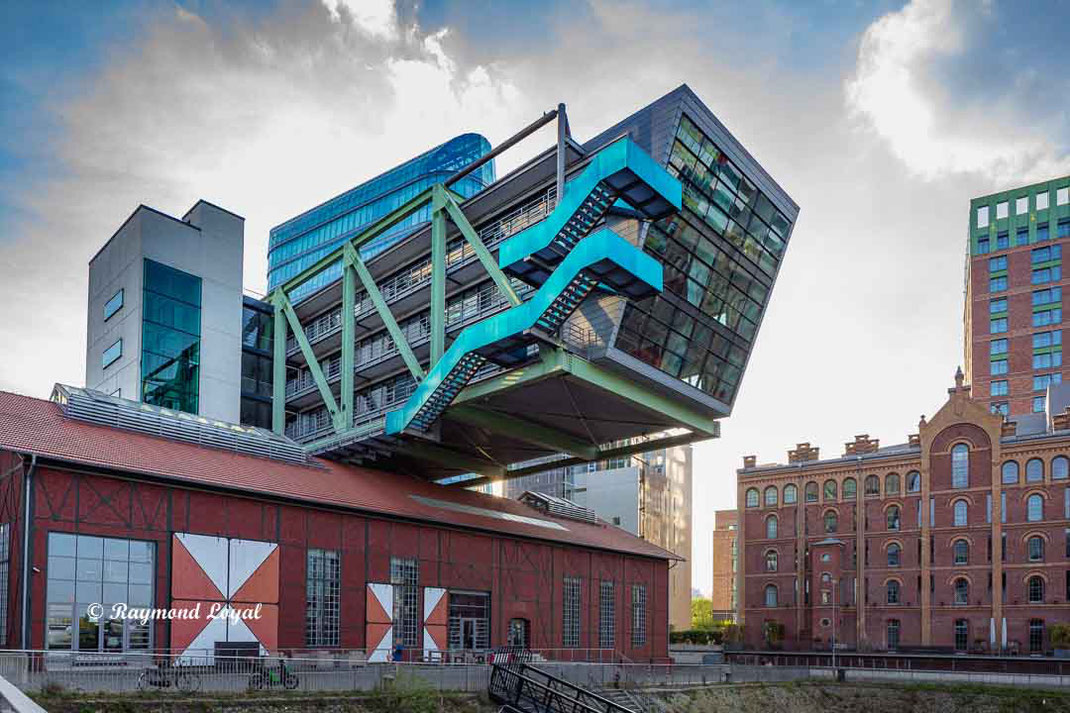Media Harbour Architecture
Media Harbour Düsseldorf (German = Medienhafen) is the city's landmark symbolising wealth, industrial power, the ability to rise from the ashes and re-inventing itself on the grounds of industrial wasteland. Around the harbour basin of the old Handelshafen (trade harbour) within a couple of years several building complexes were constructed on the planning by international renowned architects such as Frank O. Gehry, Steven Holl or David Chipperfield, who delivered the best of their creativity in order to build either from scratch or to create new out of existings structures. The area is still being developed and, most certainly, does not have to shun any comparison with London Dockyards.
Quite a plethory of excellent building were constructed around the basin of the old trade harbour, with architectural styles worth to be found in the top metropolises in the world. The speciality about Media Harbour is that not everything was built from scratch but many houses were either built on existing structures or existing buildings were incorporated into new building ensembles. Düsseldorf Media Harbour is an interesting mixture of old listed buildings and great modern architecture made of steel, concrete and glass, which rose into the sky within only a few-years time.
Today Media Harbour is home to companies from the media, communication, fashion, trade and hotel industry. Contrary to other industrial estates the Media Harbour is the obvious place to go for people from the greater Düsseldorf area and that 24/7. There is always something going on. After work people flock in droves to Media Harbour, either just for going out, for a walk, for watching the sunset or to take some images either with the smart phone or else.
There are quite a number of high street hotel groups, bars, pubs and restaurants available all over the place. Weather permitting these place are magnets for visitors all over the week.
This site does not reccommend any company nor are we connected to any such enterprise.

Around the Harbour Basin
The core of Media Harbour are the buildings immediaterly adjacent to the harbour basin "Am Handelshafen". Originally storages and warehouses were the main buildings and a number of these old storages were preserved and transformed into modern buildings, though, still maintaining a historic appearance.
Planning cautiously incorporated existing building structures into new buildings creating spaceous modern buildings on old foundations, where it was deemed possible. This is why we find many new buildings, modern architectural creations and in between there are olf storage buildings and former warehouses that were brought back to life, now serving as offices and buisness headoffices. One of the most promient ensembles in Media Harbour are the so-called Gehry Buildings, planned and created by the American star architect Frank O. Gehry, which are sitting between Handelshafen and "Am Neuen Zollhof".
Business offices spaces apart, the western side of the basin is mostly occupied by large hotel buildings and there, indeed, we find the big names of high street hotel chains, running their business between "Speditionsstrasse" street and "Julo-Levin-Ufer", with the largest complex of them all sitting at the end of Speditionsstrasse with a massive 2 tower building complex, which was opened in 2010. From there Medienhafen Bridge crosses the basin connecting to the eastern side of the basin. Medienhafen Bridge is mostly a steel and wooden structure which is a popular meeting point and famous location for photographers and models because of the stunning background.
The art of building new around old structures created a mixture of very different styles, with very characteristic buildings. It is not new wine in old bottles but rejunvenating and reviving with modern thinking on old foundations, similar to what happened to London's Canary Wharf.
All in all, the observer will find a stunning and most divers scenery in Medien Harbour with boredom never becoming an option.
Julo-Levin-Ufer
Julo-Levin-Ufer is the western side of the harbour basin where many of the preserved old storage houses still stand. Rail tracks in the pavement reveal the roots of the place as a former quay. Towards Medienhafen Bridge we find hotel buildings, though it is the rearside of the hotels as the entrances are all in Speditionsstrasse.
Medien Harbour at Franziusstrasse
Franziusstrasse lies at the southern extremity of Medien Harbour and is home to new building ensembles with glass facades. These glass facades mirror the opposite buildings in a unique way making the location a real eye-catcher giving the place its own character. Depending on the time of the day the facades are the perfect mirror for the buildings in Kaistrasse, Am Handelshafen and Julo-Levin-Ufer. Any photographer loving reflections will find everything their heart desires.



The Gehry Buildings at Düsseldorf's Medien Harbour
The Gehry Buildings are an architectural creation by US star architect Frank O. Gehry basically forming a monumental landmark thereby honouring the architect. Sitting at the end of the basin between "Am Neuen Zollhof and "Am Handelshafen, the Gehry Buildings are a real eyecatcher, espcially for everyone looking at scene and standing either at the Hyatt Regency or on Medienhafen Bridge.

Hotels in the Media Harbour
The majority of hotels in Media Harbour resides between Speditionsstrasse and Julo-Levin-Ufer, with the main entrance and postal address in Speditionsstrasse. Therefore, with the exception of the Hyatt Regency, we most see the rearside of the hotel buildings. Nevertheless, these buildings are a real eyecatcher, no matter what our vantage point might be. The most colourful of them all is the Colorium building owned by the INNSIDE Hotel.



The Colorium in Düsseldorf's Media Harbour is a 17 storey highrise, particularly striking because of its colourful glass facade, and, not to forget, the red painted roff terrace.
The building was designed by British architect Allen Alsop and completed in 2001. The INNSIDE Hotel resides in the building with the address Speditionsstrasse 9, D-40221 Düsseldorf.
Besides, because of its size and position it is hard to take close-ups. Standard wide-angle lenses will not do the job.
Media Harbour - "Am Handelsfhafen"
There are still old storage buildings at Am Handelshafen, which received a new lease of live. These storage buildings were either modernised and transformed into new office spaces with modernised facades or these buildings became an integral part of completely new structures.
Nowadays Am Handelshafen is a harbour basin without any harbour business, it was transformed into a first class business address, where high street companies set up their business in Düsseldorf.
Media Harbour - Am Zollhof
Media Harbour - Kaistrasse
Speditionsstrasse at Düsseldorf's Media Harbour
Speditionsstrasse begins at Franziusstrasse running parallel to Julo-Levin-Ufer and ending at the massive Hyatt Regency Hotel building sitting on the pier head. The Hyatt Regency complex consists of two towers. A large staircase leads up to the square between the towers, in the middle of which is a water basin, with a conference room below the basin. Be careful: don't step into the basin. The 19 storey-tower on the east side is the hotel tower and companies are located in the 17-story tower on the west side. Düsseldorf Architects JSK won the tender to plan and build the Hyatt Regency in Düsseldorf in 2003. Building works begun in 2008 and the opening of the hotel was in 2010.






































